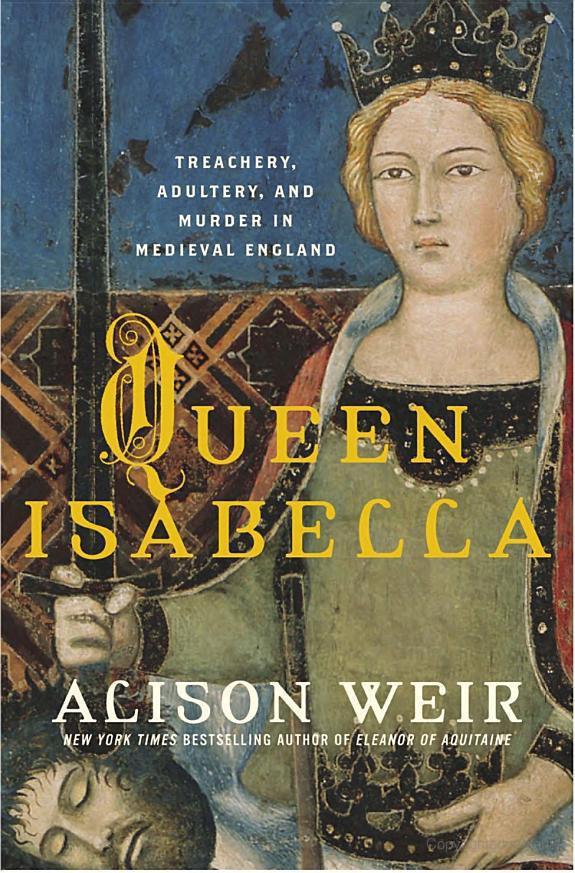
Queen Isabella
Treachery, Adultery, and Murder in Medieval England
کتاب های مرتبط
- اطلاعات
- نقد و بررسی
- دیدگاه کاربران
نقد و بررسی

Starred review from August 8, 2005
Isabella of France (1295?–1358) married the bisexual Edward II of England as a 12-year-old, lived with him for 17 years, bore him four children, fled to France in fear of his powerful favorite, returned with her lover, Roger Mortimer, to lead a rebellion and place her son on the throne and eventually saw Mortimer executed as her son asserted his power. Veteran biographer Weir (Eleanor of Aquitaine
, etc.) battles Isabella's near-contemporaries and later storytellers and historians for control of the narrative, successfully rescuing the queen from writers all too willing to imagine the worst of a medieval woman who dared pursue power. Weir makes great use of inventories to recreate Isabella's activities and surroundings and, strikingly, to establish the timing of the queen's turn against her husband and her probable ignorance of the plot to kill him. Weir convincingly argues that the infamous story of Edward II being murdered with a red-hot iron emerged from propaganda against Isabella and Mortimer. (Her unlikely assertion that Edward escaped and lived out his life as a hermit is less believable.) Weir presents a fascinating rewriting of a controversial life that should supersede all previous accounts. Isabella is so intertwined with the greatest figures of her century and the next that any reader of English history will want this book. Maps not seen by PW
. Agent, Julian Alexander
.

October 1, 2005
Popular British historian Weir ("Eleanor of Aquitane") here seeks to establish a more sympathetic understanding of one of the most notorious queens in English history. Daughter of France's King Philip IV, Isabella (ca. 1295 -1358) was unhappily married to England's gay or bisexual King Edward II. Though he fathered children with Isabella, Edward's real affections were for a series of male favorites, who gained untoward influence over affairs of the kingdom. Isabella, in the meantime, began an affair with Roger Mortimer, the Earl of March, and together they overthrew Edward, imprisoned him, and may have murdered him (against tradition, Weir disclaims Isabella's part in the murder). Their plan to rule England failed when her 18-year-old son, the future Edward III, seized and executed Mortimer and placed his mother under house arrest for the rest of her life. Weir believes that Isabella deserves credit for bringing about "the first constitutional deposition by Parliament of an English king," firmly establishing processes for parliamentary power over the Crown. She would have been appalled at the democracy that such a trend eventually produced, as Weir acknowledges. A lively work on a colorful period of English history; recommended for academic and public libraries. [See Prepub Alert, "LJ "6/1/05.] -Robert J. Andrews, Duluth P.L.
Copyright 2005 Library Journal, LLC Used with permission.

September 1, 2005
Best-selling British novelist Weir puts her exemplary writing skills, as well as her talent for alternative and provocative insight into documents and historiography, to good use in a riveting biography of the wife of England's unfortunate Edward II (who reigned 1307-27). That the king was ineffectual is commonly accepted (he was deposed and later died; according to tradition, he was murdered in a most horrendous fashion), and Queen Isabella, born a princess of France, has borne all these many centuries the label "she-wolf." Weir, in this book all British-history fans will devour, chooses, after much research and deliberation, to see her subject in more rounded terms than as "one of the most notorious femme fatales in history." The author, in fact, takes giant steps to prove that Isabella, as instigator of her own husband's removal from the throne, contributed greatly to the decline in England of the power of the monarch and thus the rise of democracy.(Reprinted with permission of Booklist, copyright 2005, American Library Association.)

























دیدگاه کاربران